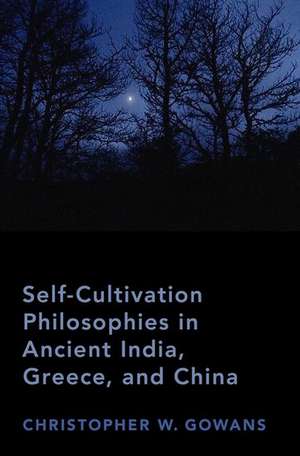Self-Cultivation Philosophies in Ancient India, Greece, and China
Autor Christopher W. Gowansen Limba Engleză Hardback – 23 noi 2021
Preț: 500.85 lei
Preț vechi: 554.79 lei
-10% Nou
Puncte Express: 751
Preț estimativ în valută:
95.84€ • 100.19$ • 80.99£
95.84€ • 100.19$ • 80.99£
Carte disponibilă
Livrare economică 03-10 februarie
Preluare comenzi: 021 569.72.76
Specificații
ISBN-13: 9780190941024
ISBN-10: 0190941022
Pagini: 344
Dimensiuni: 165 x 244 x 28 mm
Greutate: 0.66 kg
Editura: Oxford University Press
Colecția OUP USA
Locul publicării:New York, United States
ISBN-10: 0190941022
Pagini: 344
Dimensiuni: 165 x 244 x 28 mm
Greutate: 0.66 kg
Editura: Oxford University Press
Colecția OUP USA
Locul publicării:New York, United States
Recenzii
Gowans is to be commended for his bold and intelligent monograph, which offers an important and learned attempt at realizing what comparative philosophy could look like, and what we could learn from it.
There is a clear understanding throughout of diverse texts, often with single terms having multiple, context-bound references and historical anomalies, to forge a coherent account of self-cultivation that produces a meaningful life. Marked by solid grounding in relevant research, useful examples, thoughtful speculation, and clear writing, this text should have a broad audience.
Christopher Gowans delivers a compelling and elucidating account of self-cultivation as an interpretive framework enriched through three traditions of India, Greece and China. This prolific and comprehensive form of fusion philosophy creates a distinctive space for a deeper philosophical reflection and illuminates an inimitable variety of the modes of understanding that grounds our existential starting point for a human flourishing. Highly recommend this landmark work!
An insightful and accessible introduction to the three major wisdom traditions of antiquity, Gowans' work can also serve as an attractive entry into the study of philosophy overall. For those already familiar with the many sources skillfully presented here, Self-Cultivation Philosophies in Ancient India, Greece, and China will offer a welcome meeting with old friends anew.
We'd all like to change ourselves for the better. Using this kind of self-cultivation as a lens, Gowans guides you through classic ancient philosophies from around the globe. Informed by current scholarship, Self-Cultivation Philosophies in Ancient India, Greece, and China draws new connections between classic texts, making them both practical and approachable.
There is a clear understanding throughout of diverse texts, often with single terms having multiple, context-bound references and historical anomalies, to forge a coherent account of self-cultivation that produces a meaningful life. Marked by solid grounding in relevant research, useful examples, thoughtful speculation, and clear writing, this text should have a broad audience.
Christopher Gowans delivers a compelling and elucidating account of self-cultivation as an interpretive framework enriched through three traditions of India, Greece and China. This prolific and comprehensive form of fusion philosophy creates a distinctive space for a deeper philosophical reflection and illuminates an inimitable variety of the modes of understanding that grounds our existential starting point for a human flourishing. Highly recommend this landmark work!
An insightful and accessible introduction to the three major wisdom traditions of antiquity, Gowans' work can also serve as an attractive entry into the study of philosophy overall. For those already familiar with the many sources skillfully presented here, Self-Cultivation Philosophies in Ancient India, Greece, and China will offer a welcome meeting with old friends anew.
We'd all like to change ourselves for the better. Using this kind of self-cultivation as a lens, Gowans guides you through classic ancient philosophies from around the globe. Informed by current scholarship, Self-Cultivation Philosophies in Ancient India, Greece, and China draws new connections between classic texts, making them both practical and approachable.
Notă biografică
Christopher W. Gowans is Professor of Philosophy at Fordham University, where he has served as Chair of the Philosophy Department. He works in moral philosophy, with interests in the implications of moral diversity and moral conflicts as well as ancient philosophical traditions in various cultures, especially Buddhism. He is the editor of Moral Dilemmas (Oxford University Press, 1987) and author of Innocence Lost: An Examination of Inescapable Moral Wrongdoing (Oxford University Press, 1994). In more recent years, he has written Philosophy of the Buddha (2003) and Buddhist Moral Philosophy: An Introduction (2014), both for Routledge.
